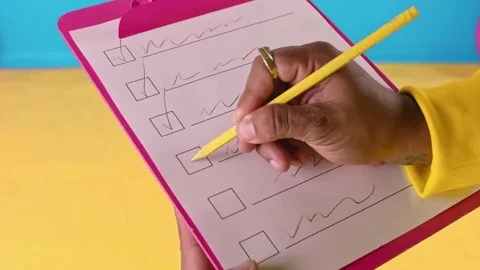
This logo isn't an ad or affiliate link. It's an organization that shares in our mission, and empowered the authors to share their insights in Byte form.
Rumie vets Bytes for compliance with our
Standards.
The organization is responsible for the completeness and reliability of the content.
Learn more
about how Rumie works with partners.
Are you going to graduate from college soon? Are you thinking about going somewhere for a graduate degree? Just like colleges require high schoolers to send in their SAT or ACT scores, many colleges require people applying to send in standardized test scores for tests like the GRE (Graduate Record Examination).
Tackling the GRE is no easy feat, though! Much like other standardized tests, preparing to ace it takes time and planning.

A solid study plan for the GRE will get you ready to ace the exam.
So What's on the GRE?
Before you can make a study plan for the GRE, you need to know the basic facts of what to expect. The test is divided into three sections:
Verbal Reasoning: answer questions based on reading comprehension and context clue skills.
Quantitative Reasoning: answer questions based on mathematical skills and logical reasoning.
Analytical Writing: write a persuasive essay based on a prompt you're given.

Figure out Your Priorities
With all this information, it might be hard to figure out what to study the most for the GRE, since everything you've looked at is something that you'll need to know for the test.

A good way to help you prioritize is to take a practice test, like this one from Kaplan. Not only can you look at what sorts of questions will be on the test, but you can also think about which types of questions were the hardest for you and what you should review the most.
Did you know?
If you want to find more practice materials, check your local bookstore. Many testing companies put out practice books to help would-be test takers get ready.
Worried about money? There are free resources available, too! Google "practice tests GRE". You can also search "GRE" in your phone's app store to find apps that testing companies have made for reviewing on the go.
Reviewing Verbal Reasoning
This section has you answer questions based on:
Reading Comprehension: questions that show you understand what you just read.
Text Completion: fill-in-the-blank questions where you choose which words or phrases make the most sense.
Sentence Equivalence: fill-in-the-blank questions where you choose the two answers that will make the sentence mean the same thing.
How do I study for the Verbal Reasoning section?
Look at practice questions and:
Practice finding the main idea in whatever you're reading. Know what the reading is talking about.
Identify the patterns used by trap answers. If you know how they're trying to trick you, you'll have a harder time being tricked!
Look for clues in context. Terms like "despite" or "as a result" can hint at what will work best.

Quiz
Here's a sample version of a sentence equivalence question: "One good strategy on the GRE is to look for the _________ of a reading passage." Select all answers that apply:
"Main idea" and "gist" both complete the sentence sensibly and hold the same meaning, allowing the sentence to change little between the use of either word.
Did you know?
You can also read high-quality national newspapers and magazines to help you prepare. Not only will you see more sophisticated writing (like what's used on the GRE), but knowing more about plenty of subjects can help give you more example options you can address in the Argumentative Writing section!
Reviewing Quantitative Reasoning
You'll have a few different types of quantitative questions:
Quantitative Comparisons: You'll be given two statements that will require minor calculations to attempt to find a value, then be asked which is bigger, if they're equal, or if there is not enough information to figure it out
Multiple Choice: These can range from algebra and geometry to number lines and graphed functions. They'll look just like the math questions you see on standardized tests. Sometimes there will be one answer, and sometimes there will be more than one. Make sure to read carefully!
Numeric Entry: You'll be asked to type your answer into a box (or two separate ones if it's a fraction). Just like multiple choice, the topics will include a range of math topics.
How do I study for the Quantitative Reasoning section?
Look at practice questions and:
Simplify or plug in numbers. If you make the values for comparisons easier to understand, the right answer will be easier to find.
For multiple choice, take advantage of the format. The answer is already there in the options. You can use it to check your work or help you estimate.
For numeric entry, read carefully! Sometimes there might be a label next to the box, which can help you figure out which unit to use. Make sure if you have to round, you're following directions.
Don't forget math's most important rule:

Reviewing Analytical Writing
Writing an essay in 30 minutes based on a prompt you're just seeing for the first time probably sounds intimidating. However, if you practice, you've got this!

What will I have to write about?
Your essay prompt will give you a statement like "The best way to teach is to praise positive actions and ignore negative ones."
Pick a stance. Do you agree or disagree with it? To what extent?
Keep in mind that format could vary. You could be responding to a claim of a certain belief like the one above, be told what a certain group of people (like the government) should do in a certain situation or how they should be acting
You might sometimes be asked to add counterarguments to help make your claim stronger.
The topics and statements are designed to be general ones that anyone can respond to. You won't need specialized knowledge.
How do I study for the Analytical Writing section?
Keep writing practice essays.
Take a look at the sample pool of topics, then pick one and get started.
Spend a few minutes planning how you'll structure your argument. Which stance are you taking? What are your examples to back up your stance?
Get used to working in the time limit — you'll only have 30 minutes when you're taking it for real!
Quiz
Is this a proper GRE prompt statement? "When planning courses, educators should take into account the interests & suggestions of their students because students are more motivated when interested in what they're studying."
This statement is one that would appear on the GRE. A test-taker could make a thesis about whether they agree or disagree, then provide examples based on their own experiences and general knowledge.
Thinking About a Sample Study Plan
Now that you know what you can do to study for each section, you need to make your study plan for the GRE.
Map out your time. When are you taking the GRE? Try to figure out what your week will look like, and when you can set aside some time to study.
Assign tasks to each block of time. What are you doing during your study time? Are you reading information about the test and strategies? Taking a practice test? Knowing what you're doing can help you figure out how much time you need for it.
Keep it balanced. Don't forget to study for all three sections. While you should give extra time to practice something you struggle with, you can leave yourself unprepared if you don't keep your skills sharp for each part of the test.
Don't overwork yourself. If you study for the GRE for hours at a time almost every day, you could burn yourself out. It's okay to take time for other things in your life. If you have a busy day, try 5-10 minutes at a time on a GRE phone app.
Once you have a study plan for the GRE in place, all you need to do is...

Did you know?
How much time you have before the GRE will depend on when you schedule your test date and how far in advance you register. While your study schedule will ultimately be up to you, there are some sample ones out there if you want something that's already structured. Magoosh has a lot of sample options based on how long you have until the test and how often you can study.
Take Action
Get ready for the exam with an effective study plan for the GRE!

This Byte has been authored by
Erica Kauffman
Learning Designer | Educator